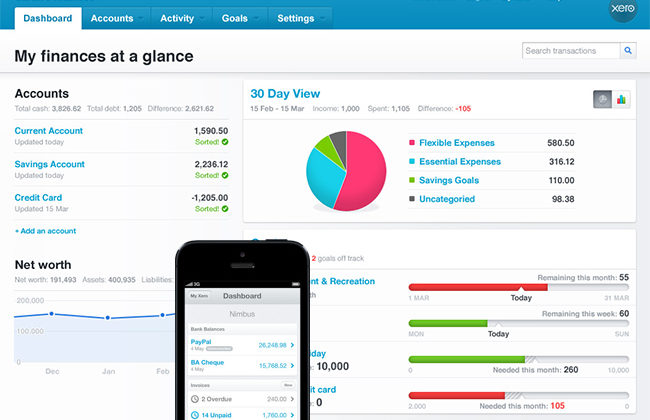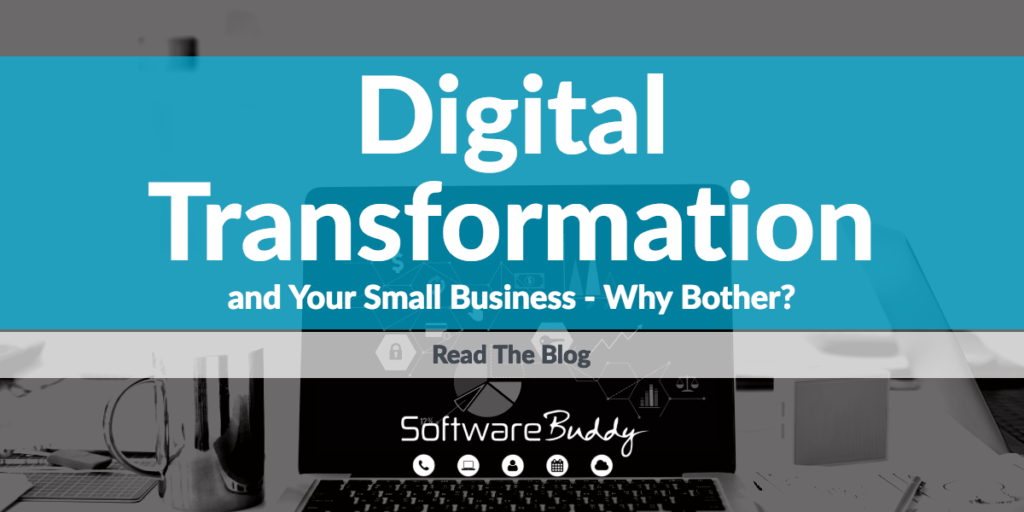Digital Transformation and Your Small Business – Why Bother?
If the idea of digital transformation seems a little bit daunting to you and your business – causing months of disruption and costing a fortune. Software Buddy are here to tell you that it doesn’t have to be this way.
When you break it down, all that digital transformation really means is using new technology to make things flow better.
Putting apps, systems and digital filing in place to get your workflow running more efficiently and make life easier. Helping to reduce costs, save you time and boost profitability.
Up till now the way that your business has been making sales, talking to customers and running your accounts has been working perfectly well. So instead of telling you to completely change the way in which you do business, we want to help you pick the best bits of digital transformation. Helping you to use them in a way that makes your life easier.
We’ll help you to identify the tools and systems that will benefit your small business, fitting in seamlessly with the way in which you work. Then, we help you to implement it with the least hassle and disruption.
After this, Software Buddy help you to harness the tools so that you can boost your efficiency, open better lines of communication with your staff and customers, as well as improving profitability.

Digital Tax Is Coming
Making Tax Digital (MTD) is an initiative from the government that requires nearly all national insurance and tax management and payments to be done online. MTD applies from April 2019
Even if you file your taxes electronically already, you will still need to make sure that the system you use is up-to-date and a commercial software system that has been approved by HMRC.
In short, digital tax needs to be a part of your digital transformation strategy. The first step is to understand what it means, then how it will affect you. Read more about this in our full guide to digital tax.

How Can Digital Systems For Finance and Operations Help Your SME?
For the most part, Making Tax Digital may have played a big part in choosing a software package that manages your accounts. After all, one of compliance requirements is to use a commercially recognised, HMRC approved system.
If you are not already using one, you’ll need to transition to more up-to-date commercial software to maintain your business records.
Use MTD to initiate your digital transformation roadmap and you could enjoy easier receipt keeping, automated invoice reminders for overdue bills and automatically completed accounts.
So, what does this mean in practice?
From April 2019 you will have to file your VAT returns online. If you charge VAT and don’t already file online, you’ll need to start using a software tool such as Xero, Quickbooks or Sage. Licenses start from around £40 a month and most can be downloaded to your phone.
For landlords who earn over £10,000, this also means keeping digital records – meaning digital transformation should be on your radar now.
Making Tax Digital legislation, published in April 2019, applies mostly to VAT. Additional measures for digital filing like corporation tax are expected to come into practice in 2020.
Decoding How Digital Systems For Sales and Marketing Can Drive Efficiency
Let’s face it, marketing is the engine that drives most small businesses forward. Word of the mouth may still be the most effective form of marketing, yet online reviews and social media are becoming just as powerful.
Limits in time and budget often mean that small business owners can’t spend as much time on marketing as they would like. Choosing digital tools to help you automate your systems can be a huge benefit to lots of different areas of your business.
From a sales perspective: having access to a (user-friendly) CRM can help your sales team to work more efficiently. Meaning more leads and more deals for the same amount of effort.
- You can use digital tools to automate some of your marketing: From using a tool that schedules your social media posts for you to send out emails automatically to a customer every couple of months. Using a CRM is a way to give your customers a better experience and engage them a little more.
- GDPR: You have probably heard this phrase countless times but what exactly does it mean for small business owners? Tools like MailChimp can help you here too, relieving some of the burdens of compliance.
Other benefits to digital transformation marketing include; less time wasted, better organisation and more consistency.

How To Prepare Your SME For Digital Tax
Whether you want it or not, digital tax legislation is here to stay. You can use this directive to benefit yourself and your business.
From April 2019, all businesses who pay VAT will need to file their payments online using a consumer regulated system that’s has been approved by HRMC.
Make life easier by using our plain English digital tax checklist, designed to take some of the stress out of your digital transformation journey.
Exploring Your Options When It Comes To Choosing (Helpful!) Digital Systems For Finance and Operations
Finance and operations are two areas in business that are absolutely crucial to get right. And are often the two that people are the most reluctant to digitise.
Realistically, finance and operations are the bread and butter of your business – the things you do every day and the cash you make from those activities. They affect how you manage jobs and staff, make and take payments, manage cash flow and even pay suppliers and employees.
So it’s here that digital transformation can have the biggest impact. Online finance systems can reduce mistakes and make accessing financial reports easy. They can even handle payroll, billing and invoice chasing so you don’t have to.
If you struggle to juggle workloads and see which employees are at what job and when- project management systems can make it all much easier. Regardless of whether you’re on a job site or in the office.
The SME’s No-Nonsense Guide To Choosing New Digital Systems For Sale and Marketing
Ok so you’ve seen how effective digital systems are, especially when it comes to sales and marketing operations, but what are your options?
As you’d expect, there are tons, including CRM and pipeline management. They range from basic to scalable systems (such as Salesforce). Whilst others, like HubSpot, pull double duty and can be used to manage leads and handle some aspects of marketing automation.
The system, or combination of systems, you choose will depend largely on the size and nature of your business and which tasks you plan to entrust to digital systems.
When you start to set your digital transformation strategy into place, you might realise that you already using some of the aspects. For example, if you use MailChimp for your email marketing you are using a marketing automation tool.
There’s no single right answer or a magical combination. Choosing the right digital systems for sales and marketing will require a thorough analysis and trial and error.
There’s no single right answer or magical combination. Choosing the right digital systems for sales and marketing will require a thorough analysis and trial and error.

Making A Decision On Digital Tax
Just as with paper filing, late submission of digital VAT returns will result in the dreaded brown envelope bearing a HMRC fine dropping on to your doormat.
The cost of non-compliance could seriously outweigh the initial expense of moving your tax and financial affairs over to a digital system – even when you consider the monthly fees for Quickbooks or other MTD compliant package.
Of course, you don’t have to go this alone. When you weigh up the frustration of handling your taxes solo along with the time needed to do the job, you might find that it’s most cost-effective to simply hire an accountant.
If you don’t already have an accountant who works digitally, hiring a professional to audit and systemise your tax affairs should be high up on your digital transformation roadmap.
Deciding On Digital Systems For Finance and Operations: A Step-By-Step Guide
When you’re deciding on the right digital system for your business’ finance and day to day operations, there are literally dozens of things to consider.
Get it wrong and it will cost you. So we suggest taking a systematic and organised approach.
First, you will need to gather all your data together to be able to make a decision. Complete an audit on your business or call in a digital transformation professional like Software Buddy to do this for you. This gives you the information you need to sit down and decide what your ideal solution looks like.
Focusing on what you need rather than weighing up one piece of software over the other is usually more helpful.
Once you know what you want, you (and the Software Buddy team) can shortlist finance and operations digital transformation tools that meet those requirements. Ideally, we want to find tools that tick off most of your needs to keep your systems streamlined and easy to keep track of.

The SME Owner’s Straightforward Roadmap To Deciding On Digital Systems For Sales and Marketing
Picture the scene. You’ve got a handle on digital tax. You’ve shortlisted new tools to help with digital transformation in your finances and operations. Now you just need to sort your marketing.
The final piece of the puzzle is to bring your sales and marketing together with a digital tool that makes your life easier and your lead generation more efficient.
Again, you’ll need to start with an audit and map out what an ideal solution looks like for your business.
What equipment, tools and functions do you need at your disposal to get a better return for your money? More leads? More effective marketing? How can you better control costs?
Once you know this, it’s easier to find software that facilitates those goals. As well as making it easier to avoid the wrong system and all of the costs involved with switching.
If you’re just starting out on your digital transformation journey, Software Buddy is here to help.
We provide sensible plain English advice to help you enjoy the benefits of going digital. Book a consultation with us now.

